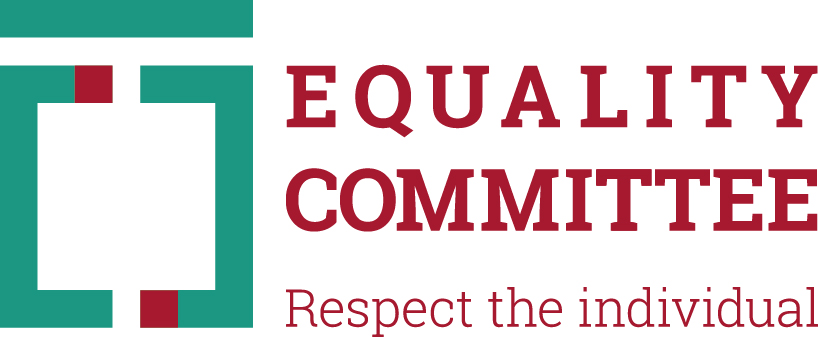
Terms of Reference of the Equality Committee
PURPOSE
The main purpose of the Equality Committee is to promote issues of equality, diversity, integration and inclusion, acceptance, understanding and appreciation of diversity, combating prejudice, discrimination and inequalities reproduced due to visible and non-visible characteristics (physiological/physical, social/lifestyle, cognitive) of the person's identity that coexist with gender - such as age, gender, sexual orientation, disability, appearance, social class, religion, beliefs, nationality, colour, country of origin, personality, way of thinking, experiences - so that the University becomes an inclusive, positive, safe, empowering and fair working and learning environment, which provides equal opportunities and supports all individuals - including the underrepresented - in their professional and personal development.
ROLE
The Committee is an advisory body to the Rector and works to improve the University's performance in matters of Diversity, Inclusion and Equality. It considers issues of strategic planning and policy development. It cultivates close collaboration with other relevant university committees, services, entities and working groups both inside and outside the University and works closely with the Diversity and Inclusion Office.
COMPETENCES
Based on the above, the Committee’s responsibilities fall under the following three pillars:
A) Policy Making
- Formulation and recommendation of university policies and procedures to the Rector, related to equality and diversity, diversity and inclusion for its staff and students, especially where achievement is limited, and where support for underrepresented individuals/groups is necessary.
- Formulation of institutional Action Plans to ensure that equality and diversity policies are effectively translated into action programmes.
- Study of any issue assigned by the Senate/Council or ex officio where there are issues that fall within its responsibilities.
B) Consulting and Support
- Encouragement and provision of advice to the academic Departments and Faculties and the university community in general, regarding the development of strategic policies and the effective integration and implementation of these policies for equality, diversity and inclusion.
- Establishment and coordination of ad hoc project teams as required for the investigation, reporting and implementation of work on specific dimensions of equality, diversity and inclusion issues (e.g., equality in terms of age, gender equality, mental health, racial equality, religious equality, lgbtqi, equality in terms of disablity).
- Review of university policies, procedures and plans related to equality and diversity and inclusion.
C) Information and Awareness-Building
- Recommendations for organizing activities to inform and raise awareness regarding issues of equality, diversity and inclusion.
- Recommendations for the promotion of relevant informational material to the members of the University community.
- Securing the effective dissemination and promotion of university policies and procedures for equality and diversity, diversity and inclusion.
Equality Committee

Terms of Reference of the Equality Committee
PURPOSE
The main purpose of the Equality Committee is to promote issues of equality, diversity, integration and inclusion, acceptance, understanding and appreciation of diversity, combating prejudice, discrimination and inequalities reproduced due to visible and non-visible characteristics (physiological/physical, social/lifestyle, cognitive) of the person's identity that coexist with gender - such as age, gender, sexual orientation, disability, appearance, social class, religion, beliefs, nationality, colour, country of origin, personality, way of thinking, experiences - so that the University becomes an inclusive, positive, safe, empowering and fair working and learning environment, which provides equal opportunities and supports all individuals - including the underrepresented - in their professional and personal development.
ROLE
The Committee is an advisory body to the Rector and works to improve the University's performance in matters of Diversity, Inclusion and Equality. It considers issues of strategic planning and policy development. It cultivates close collaboration with other relevant university committees, services, entities and working groups both inside and outside the University and works closely with the Diversity and Inclusion Office.
COMPETENCES
Based on the above, the Committee’s responsibilities fall under the following three pillars:
A) Policy Making
- Formulation and recommendation of university policies and procedures to the Rector, related to equality and diversity, diversity and inclusion for its staff and students, especially where achievement is limited, and where support for underrepresented individuals/groups is necessary.
- Formulation of institutional Action Plans to ensure that equality and diversity policies are effectively translated into action programmes.
- Study of any issue assigned by the Senate/Council or ex officio where there are issues that fall within its responsibilities.
B) Consulting and Support
- Encouragement and provision of advice to the academic Departments and Faculties and the university community in general, regarding the development of strategic policies and the effective integration and implementation of these policies for equality, diversity and inclusion.
- Establishment and coordination of ad hoc project teams as required for the investigation, reporting and implementation of work on specific dimensions of equality, diversity and inclusion issues (e.g., equality in terms of age, gender equality, mental health, racial equality, religious equality, lgbtqi, equality in terms of disablity).
- Review of university policies, procedures and plans related to equality and diversity and inclusion.
C) Information and Awareness-Building
- Recommendations for organizing activities to inform and raise awareness regarding issues of equality, diversity and inclusion.
- Recommendations for the promotion of relevant informational material to the members of the University community.
- Securing the effective dissemination and promotion of university policies and procedures for equality and diversity, diversity and inclusion.

